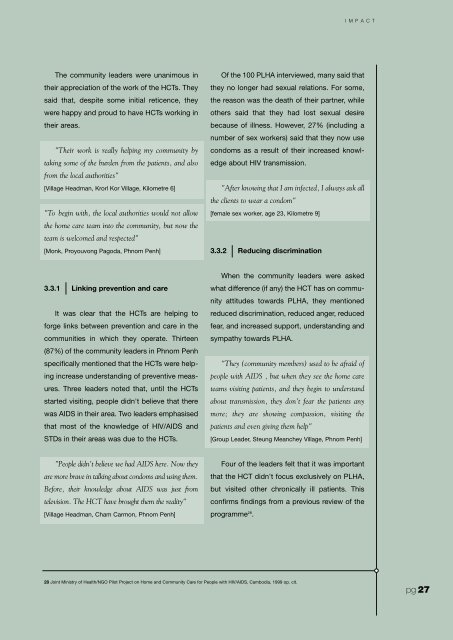PDF File - hivpolicy.org
PDF File - hivpolicy.org
PDF File - hivpolicy.org
- No tags were found...
You also want an ePaper? Increase the reach of your titles
YUMPU automatically turns print PDFs into web optimized ePapers that Google loves.
IMPACTThe community leaders were unanimous intheir appreciation of the work of the HCTs. Theysaid that, despite some initial reticence, theywere happy and proud to have HCTs working intheir areas."Their work is really helping my community bytaking some of the burden from the patients, and alsofrom the local authorities"[Village Headman, Krorl Kor Village, Kilometre 6]"To begin with, the local authorities would not allowthe home care team into the community, but now theteam is welcomed and respected"[Monk, Proyouvong Pagoda, Phnom Penh]Of the 100 PLHA interviewed, many said thatthey no longer had sexual relations. For some,the reason was the death of their partner, whileothers said that they had lost sexual desirebecause of illness. However, 27% (including anumber of sex workers) said that they now usecondoms as a result of their increased knowledgeabout HIV transmission."After knowing that I am infected, I always ask allthe clients to wear a condom"[female sex worker, age 23, Kilometre 9]3.3.2 Reducing discrimination3.3.1 Linking prevention and careIt was clear that the HCTs are helping tof<strong>org</strong>e links between prevention and care in thecommunities in which they operate. Thirteen(87%) of the community leaders in Phnom Penhspecifically mentioned that the HCTs were helpingincrease understanding of preventive measures.Three leaders noted that, until the HCTsstarted visiting, people didn't believe that therewas AIDS in their area. Two leaders emphasisedthat most of the knowledge of HIV/AIDS andSTDs in their areas was due to the HCTs.When the community leaders were askedwhat difference (if any) the HCT has on communityattitudes towards PLHA, they mentionedreduced discrimination, reduced anger, reducedfear, and increased support, understanding andsympathy towards PLHA."They (community members) used to be afraid ofpeople with AIDS , but when they see the home careteams visiting patients, and they begin to understandabout transmission, they don't fear the patients anymore; they are showing compassion, visiting thepatients and even giving them help"[Group Leader, Steung Meanchey Village, Phnom Penh]"People didn't believe we had AIDS here. Now theyare more brave in talking about condoms and using them.Before, their knowledge about AIDS was just fromtelevision. The HCT have brought them the reality"[Village Headman, Cham Carmon, Phnom Penh]Four of the leaders felt that it was importantthat the HCT didn't focus exclusively on PLHA,but visited other chronically ill patients. Thisconfirms findings from a previous review of theprogramme 28 .28 Joint Ministry of Health/NGO Pilot Project on Home and Community Care for People with HIV/AIDS, Cambodia, 1999 op. cit.pg 27
















